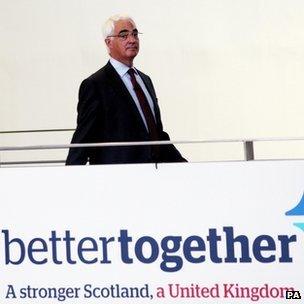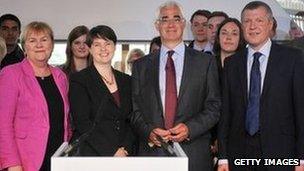Scottish independence: 'Better together' to preserve Union
- Published

Mr Darling spoke of the core issues: the economy, the currency and security
Seldom has celebrity been so assiduously eschewed as at today's launch of Better Together, the campaign to preserve the Union by fostering a No vote in the forthcoming referendum on independence.
Nary a movie star. Not a single quaver of song. Not one stanza of verse, empathetic or otherwise. They didn't even risk importing a UK government minister in case that hinted at political stardom (or, more probably, external advice.)
Instead, after Alistair Darling had opened the gig, there was a parade on stage of Scots from all walks of life. (There was occasional reference to "ordinary" Scots. I will not use that wording: no Scot is ordinary.)
Said Scots were interviewed by MSPs Annabel Goldie and Kezia Dugdale. Now, admittedly, the opening speaker in this parade acknowledged that she had previously been crowned Miss Inverness. Her interlocutor, Miss Goldie, demurely noted that she had steered clear of seeking the comparable honour of Miss Renfrewshire in her youth.
The audience chuckled, companionably. And, for razzmatazz and bright lights, that was as far as it went.
Which was, of course, deliberate. It is the argument of the SNP and others that independence is the natural condition of Scotland, that it is a "self-evident truth" (to borrow, as they did, a phrase from another statement of independence), that the people of Scotland are best placed to determine the political, economic and social future of Scotland.
Core issues
Hence, the Unionists also want to sound and look like elemental, grassroots Scotland. They do not want to look and sound like grandees preaching to the people. Far less do they want to look and sound like Westminster states people laying down advice.
Hence the parade of citizens. Some spoke of their hopes. Others of their fears. Above all, they spoke of Scottish patriotism, of their delight when Scotland succeeds on the sporting field or anywhere else.
In truth, this section went on a little too long. But, understandably, each invited participant was keen to contribute - and their interviewers were loath to cut them short. However, in itself, it was effective.
And the wider substance? Relatively limited at this stage. But, then, as with the Yes Scotland launch, this was merely the preamble to a rather protracted campaign.
Mr Darling spoke of the core issues: the economy, the currency, security, defence. And family. He would not, he argued, cede all the empathetic or patriotic ground to the Nationalists. It was more than possible, he insisted, for the Union to attract emotional support.
He declared it would be a positive campaign and, to the extent that he stressed the claimed advantages of Union, it was so. However, there was also the politics of fear and anxiety on display.
Witness the crisis in the Euro, said Mr Darling, and be afraid. Fret at the consequences of a currency union unsecured by political strength.
Glance back to the RBS collapse and be afraid. Shudder at the claimed inability of small-scale Scotland to launch such a rescue.
Questioned on these aspects, Mr Darling insisted that it was perfectly legitimate for those defending the Union to pose some awkward questions to their opponents. The intention was to win.
'Bogus choice'
In response, the Nationalists offer some telling points. Is Mr Darling, is Labour, comfortable sharing a platform with the Tories? Yes, they say, on the limited, single basis of defending the Union.
More, is Alistair Darling, is Labour, saying that they would prefer a Tory UK government to Scottish self-government? No, they want a Labour UK government AND Scottish self-government.

Labour, Tory and Lib Dem politicians were united at the launch
At which point Nationalists revert to the classic "second preference" challenge which once confronted Labour's George Robertson. If not a Labour UK government at Westminster, then what? The Tories in power at the UK level? Or independence?
At which point, Unionists tend to say that this is a bogus choice: that a UK government is for but a few years while independence would be irrevocable. That debate continues.
Then there is a further contention. What does a No vote mean? And, for that matter, a Yes vote. Unionists are inclined to say that the SNP has failed to set out its prospectus in any detail. Mr Darling argued today that Mr Salmond was unable to answer elementary questions.
But how about in the other direction? Alex Salmond says he will set out his detailed planning in a Scottish government white paper late next year, twelve months out from the ballot.
But, says Mr Salmond, the Unionists will not say what further powers, if any, might come the way of Holyrood, should independence be rejected.
Second question
The three main parties supporting the Union decline to set out a detailed alternative for two reasons. One, they say it is vital to deliver an unsullied verdict on the Union, for or against. Two, they cannot agree what that detailed alternative might be with the Liberal Democrats inclined to devolve rather further than their colleagues.
Indeed, Mr Darling regards the very challenge as a bogus distraction by Mr Salmond. He voiced his suspicions that the SNP leader was largely trying to prolong the process because he feared that, if confronted with the simple choice of independence, Scots would say No.
Mr Darling even suspects that Mr Salmond is prepared to push the second question so vigorously that it proves impossible to hold a structured, legally watertight ballot. Which means? Either there is a consultative plebiscite which could face a challenge in the courts. Or the referendum is thwarted entirely.
Alex Salmond is adamant that his primary objective is to ask the Scots to decide on independence - but that he does not want to pre-empt another option, such as Devo Plus or Max, is such can be clarified.
In which case it is conceivable, I surmise, that he might push the second option - but eventually concede in order to secure legal fiat from Westminster for a single question. At which point he uses the issue as a political tool to blame Westminster interference and seek Scottish endorsement for independence.
More to come. Much more.